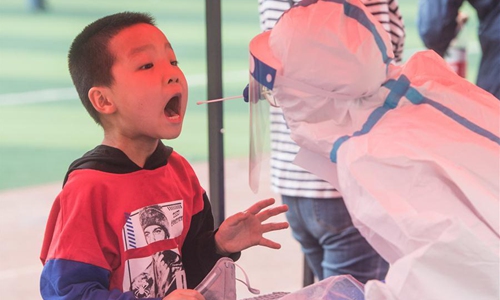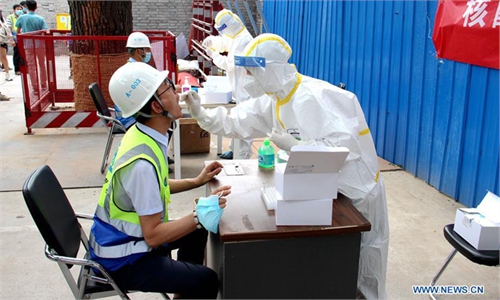
Photo: Xinhua News Agency
Beijing will arrange a second test for key clusters who are about to be released from medical observation, as the epidemic situation in the capital city is still grim and complex. Virologists revealed that new high-accuracy testing kits are being used.
At a conference of Beijing's leading group of epidemic prevention and control on Monday, Beijing government officials stressed the importance of gearing up nucleic acid testing ability and strictly managing and testing those with connections to the market supply chain. Party Secretary of CPC Beijing Municipal Committee Cai Qi, Mayor Chen Jining and expert group leader from the National Health Commission Zeng Yixin attended the meeting.
Key clusters of people, including those who have been to the Xinfadi wholesale market and their close contacts, all sellers or employees of the city's markets, restaurants, delivery and logistics companies, must all be tested as soon as possible. Medical workers, traffic, bank and supermarket staff living in medium- and high-risk regions must be fully tested, according to the conference.
Priorities should be given to key areas, and secondary testing should be arranged for key groups who are to be released from medical observation, and attention should be paid to other key areas and high-risk susceptible groups, officials said, noting that the city must work tirelessly and resolutely to win the battle against the epidemic.
Beijing health authorities increased the number of nucleic acid testing institutions and hospitals to 128 as of Monday. The Beijing Health Commission said on Sunday that the city's maximum daily testing ability has been ramped up to 230,000 samples per day, the Xinhua News Agency reported.
The commission reported 13 new domestic cases of COVID-19 and two suspected cases on Monday, bringing the total number to 249 since June 11. Zero new cases have been reported in 12 out of Beijing's 16 districts.
Yang Zhanqiu, a deputy director of the pathogen biology department at Wuhan University in Hubei Province, told the Global Times on Tuesday that while post-quarantine testing is already a necessity, Beijing's secondary testing is especially important given that the new type of coronavirus that emanated from the Xinfadi Market has never been seen in China before.
Yang disclosed that Beijing is widely applying a new kind of testing kit with an accuracy of more than 95 percent to cope with the latest outbreak. "Testing methods must change as the virus changes."
Wu Zunyou, chief epidemiologist at the Chinese Center for Disease Control and Prevention, told the People's Daily in a recent interview that the strain is unlike the one found in Beijing two months ago, and is more likely from Europe.
Yang Peng, an expert at the Beijing Center for Diseases Prevention and Control, told media that the genome sequencing of the strain of the coronavirus in Beijing shows it originated from Europe.
Preliminary investigations show that the virus found on samples from the Xinfadi Market is related to strains China has seen from imported cases. The source of the virus is still being traced, and it is not known how it entered the market, Yang said.
During the conference, officials stressed that epidemic prevention and control regarding the market food supply chain must be carried out strictly and thoroughly. The Xinfadi wholesale market should be completely disinfected, and supervision of cold-chain food and food prices will be strengthened.
It was also stressed that continuously strict management of access into and out of Beijing should be conducted, as people have been urged not to leave Beijing unless necessary. Residents are encouraged to report symptoms and go to hospitals as soon as possible, and to cooperate with epidemiological investigations.
Beijing's strict management measures have also been particularly important, greatly reducing the spread of virus with different strains across the country, said Yang.


